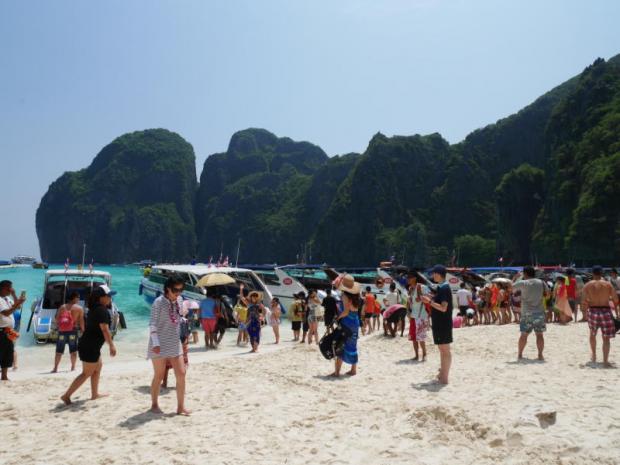
Chinese arrivals in Thailand this year are expected to drop for the first time in a decade, with the plunge causing the country's tourism growth to miss its target.
The situation in other foreign markets for the remainder of the year is not much better, heightening concern among tourism operators such as Ittirit Kinglake, president of Tourism Council of Thailand (TCT).
He said that if Chinese arrivals do not bounce back this year, it will mark the first decline in this market since 2009. Arrivals from China represent about a quarter of international tourists in Thailand each year.
Other markets such as the Middle East, Russia, Eastern Europe, Africa and the Americas are also weakening, making the government's target of 37-38 million arrivals this year a stretch, Mr Ittirit said.
The TCT chief attributed the Chinese dip to the July boat accident in Phuket, while an uncertain global economy is affecting other key markets.
Rising oil prices and currency jitters in some emerging-market economies like Turkey are also disturbing tourism sentiment.
Thailand's tourism industry has played a vital role in the economy over the past several years, and the sector contributed as much as 20% to the country's GDP last year.
The country has also enjoyed receiving a high number of Chinese tourists over the past decade. The number of Chinese tourists increasing from 777,508 in 1999 to 1.2 million in 2000 and continue in surge to 2.7 million in 2012, 7.9 million in 2015 and 9.7 million last year.
Up to 10 million Chinese were expected to visit Thailand this year, but the boat accident that killed 47 Chinese tourists has reverberated through local tourism business.
Since the disaster, more than 10 airlines in China, both regular service and charter flight, have cancelled plans to bring customers to Thailand. As such, the TCT revised down the China market outlook to fewer than last year's figure of 9.7 million.
The TCT also revised down its tourism income view for international markets to 1.9 trillion baht from 2 trillion.
Vichit Prakobkosol, president of the Association of Thai Travel Agents (Atta), said the decline was noticeable during Sept 1-23, as Chinese arrivals using Atta members who passed through Suvarnabhumi and Don Mueang airports totalled 130,609, sagging 39.7% from the same period last year.
In fact, Thai tourism started to feel the pinch in July and August as arrivals from mainland China fell 11% and 22% year-on-year.
Other markets of Atta members from Jan 1 to Sept 20 also dropped, including the Middle East (-44.8%), Africa (-32%), Russia and CIS (-18%), and the Americas (-4.7%).
Despite declines in the China market, Mr Vichit is confident that international visitors to Thailand will continue to increase by about 8% from last year, outstripping global tourism's 5% rise, thanks to improvement in other regions.
Atta predicted significant growth from major markets in Asia such as Hong Kong, which is expected to expand by 25%, Taiwan (+20%), India (+12%), Malaysia and the Philippines (+11%), and Vietnam (8.5%).
In addition, Europe and eastern Europe set for growth of 3-5% and 10%.
According to the TCT and Atta, Thailand is facing tough competition as many tourism organisations and private companies such as airlines and hotels put great effort into luring tourists away from Thailand.
For instance, Hong Kong and Macau have put up more than 10 events this month to lure foreign tourists, including jazz and wine festivals.
Bali is promoting its low season by inviting visitors to enjoy activities away from the beach and get cheap accommodation.